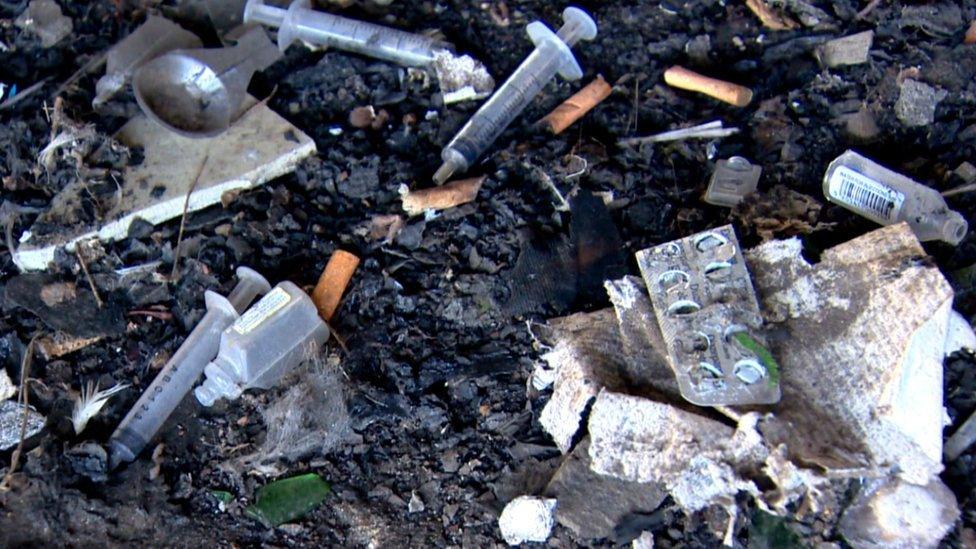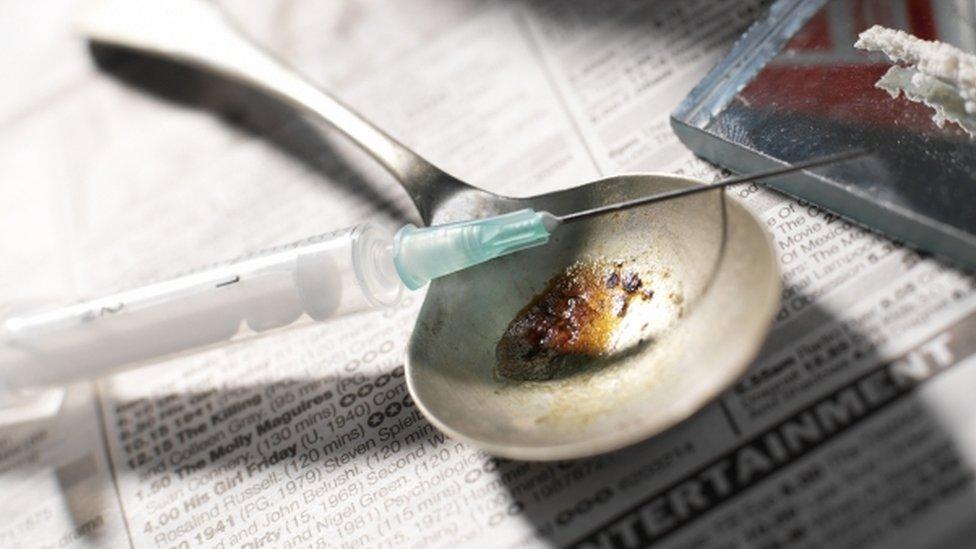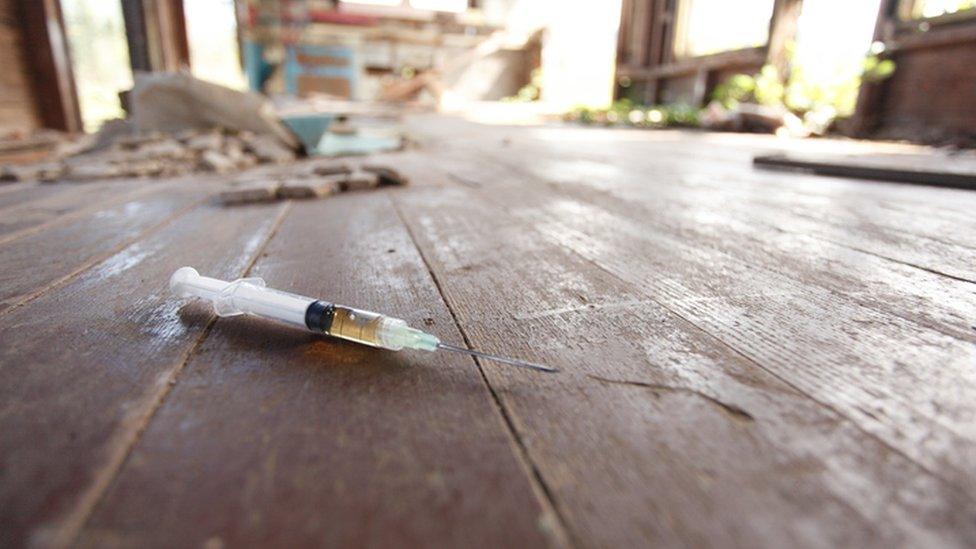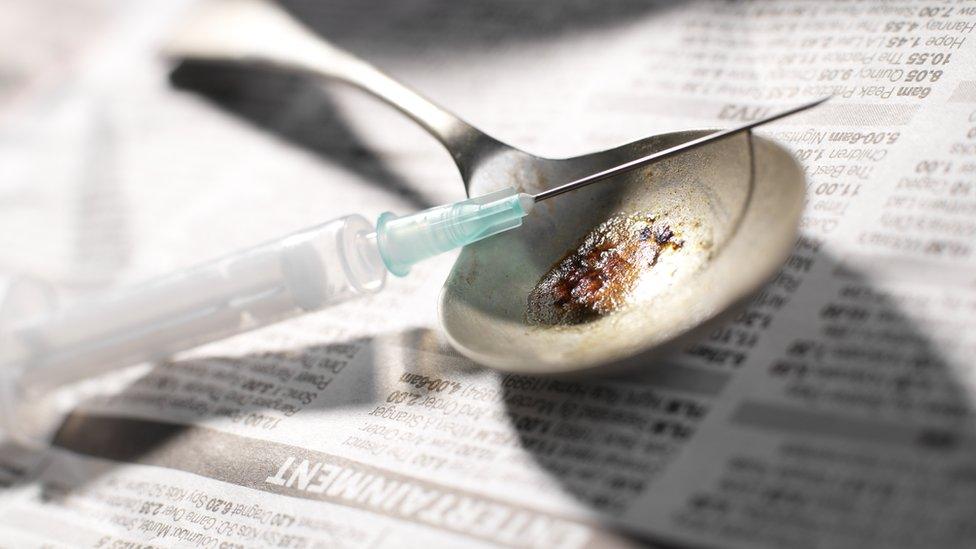Glasgow site found for UK's first legal drug addict 'fix room'
- Published

The facility could help up to 500 users who take drugs openly in Glasgow city centre streets and who are rarely in touch with services
A site for the UK's first legal drug consumption room has been identified by council and NHS officials.
It is hoped the facility in Glasgow city centre, which would allow users to take drugs under supervision, could be operational in early 2018.
Proposals to be discussed by the city's Integration Joint Board (IJB) also include the prescription of medical-grade heroin for some addicts.
Doctors said the proposal would save money for the wider NHS.
The IJB said the annual cost of the service would be £2.36m, paid for by the city council and NHS Greater Glasgow and Clyde.
The site, owned by the city council, has been identified between Trongate, Saltmarket and the River Clyde and officials are discussing leasing arrangements.
HIV cases
The proposals for a safer drug consumption facility (SDCF), with a separate service allowing some users to access heroin-assisted treatment (Hat), followed concern about a possible public health outbreak following a steep rise in the number of HIV cases among drug injectors.
There are an estimated 90 new cases of HIV diagnosed in Glasgow among people who inject drugs in the city, which health officials say could cost the NHS more than £29m over the lifetime of the sufferers.
At least 78 cases diagnosed in Glasgow since 2015 could potentially create lifetime costs to the health service of £29.64m. This group has now grown to 90, with 12 infections already recorded to date this year.

It is estimated that there are about 500-600 people injecting drugs in and around Glasgow city centre
Drugs deaths in the city remain high - 157 in 2015.
Dr Saket Priyadarshi, the health board's associate medical director said: "There will be a benefit to the costs experienced in our acute services, hospitals, A&E departments, GP appointments, prisons, criminal justice system, housing etc."
Users attending the services will be offered health care and other support such as housing and financial help.
Glasgow has an estimated 13,600 problem drug users - 3.2% of the city's population.
The IJB said: "In terms of social costs incurred as a result of problem drug use, namely the cost to victims of crime, the cost of pain and suffering for the individuals themselves and their families caused by drug-related death, it is estimated that the annual cost of each problem drug user is £31,438."
Complex needs
Andrew Horne, director of Addaction - Scotland's biggest provider of community drug and alcohol services - said the hardcore of 400-500 people injecting drugs in and around Glasgow city centre were the hardest to reach and engage with.
"These people tend to have long histories of heroin use and as a result have complex needs - including physical health conditions that make them even more at risk of overdose," he said.
He said the primary aim of the centre was to reduce public consumption, discarded equipment and drug-related deaths, but said there were other crucial spin-off objectives.
"In particular, people would get access to a range of other services like health check-ups, social work support and access to treatment and recovery.
"It's impossible to help people make changes in their lives if they are not in touch with local services; which is something supervised injection facilities could be the gateway to."
'Clear evidence'
David Liddell, of the Scottish Drugs Forum, said drug consumption rooms had proved effective in other countries.
"They may seem controversial but when you see that these have been running in many countries in Europe for up to 30 years, you get a different perspective," he said.
"Holland now has 31 drug consumption rooms and Germany has 24, for example.
"From these years of practice, clear evidence has emerged as to the effectiveness of these facilities."
The IJB will be asked on Wednesday to direct the city council and the health board to proceed with the next stages of the project.
But it must also seek a legal exemption from the Lord Advocate to allow the possession of street-purchased heroin within the SCDF.
A Crown Office statement said: "Misuse of drugs legislation remains a reserved issue and any such scheme has a number of different policy considerations that the Scottish government will want to consider in detail.
"The Lord Advocate has yet to receive a detailed proposal in relation to any such scheme."
- Published31 October 2016

- Published17 August 2016
